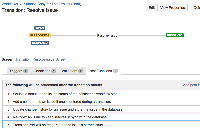-
Bug
-
Resolution: Not a bug
-
Low (View bug fix roadmap)
-
None
-
7.0.0-OD-01, 7.0.0-OD-05
-
None
-
7
-
NOTE: This bug report is for JIRA Server. Using JIRA Cloud? See the corresponding bug report.
Summary
On JIRA 7 when using the jira-misc-workflow-extensions 'Transition Parent issue', some transitions will fail if the parent transition cannot be completed
Environment
JIRA 7
Plugin: JIRA Misc Workflow Extensions
Steps to Reproduce
- Create a workflow with the following post function: On Open to In Progress: "Transition Parent with ID X" (transition parent issue from open to in progress for example)
- Create a Task and put it to the 'In Progress' Status
- Create a subtask and transition it from Open to In Progress (the transition where you've configured the post function in step 1)
Expected Results
In JIRA 6.X the Sub Task transitions normally, an error will be logged but the transition completes.
Actual Results
In JIRA 7, the Parent Task can't be transition using the ID because that transition only applies to the Open status.
Since the Parent Task can't be transitioned, the Sub Task now also fails to transition.
2015-08-04 10:31:09,435 ajp-nio-127.0.0.104-8009-exec-177 ERROR n06963 631x33611x2 27g572 160.67.51.136,131.103.27.33 /secure/WorkflowUIDispatcher.jspa [c.a.jira.workflow.OSWorkflowManager] Caught exception while attempting to perform action 4 from workflow 111781 on issue 'EX-1' @4000000055c078571a3be394 com.opensymphony.workflow.InvalidActionException: Action 4 is invalid @4000000055c078571a3be394 at com.opensymphony.workflow.AbstractWorkflow.doAction(AbstractWorkflow.java:559) @4000000055c078571a3c0aa4 at com.atlassian.jira.workflow.OSWorkflowManager.doWorkflowActionInsideTxn(OSWorkflowManager.java:995) @4000000055c078571a3c0e8c at com.atlassian.jira.workflow.OSWorkflowManager.doWorkflowAction(OSWorkflowManager.java:947) @4000000055c078571a3c0e8c at com.atlassian.jira.workflow.WorkflowTransitionUtilImpl.progress(WorkflowTransitionUtilImpl.java:417) @4000000055c078571a3c1274 at com.innovalog.jmwe.plugins.functions.TransitionParentIssueFunction.executeFunction(TransitionParentIssueFunction.java:78) @4000000055c078571a3c1a44 at com.innovalog.jmwe.plugins.functions.AbstractPreserveChangesPostFunction.execute(AbstractPreserveChangesPostFunction.java:123) @4000000055c078571a3c1a44 at com.opensymphony.workflow.AbstractWorkflow.executeFunction(AbstractWorkflow.java:1050) @4000000055c078571a3c29e4 at com.opensymphony.workflow.AbstractWorkflow.transitionWorkflow(AbstractWorkflow.java:1446) @4000000055c078571a3c29e4 at com.opensymphony.workflow.AbstractWorkflow.doAction(AbstractWorkflow.java:564) @4000000055c078571a3c2dcc at com.atlassian.jira.workflow.OSWorkflowManager.doWorkflowActionInsideTxn(OSWorkflowManager.java:995) @4000000055c078571a3c31b4 at com.atlassian.jira.workflow.OSWorkflowManager.doWorkflowAction(OSWorkflowManager.java:947) @4000000055c078571a3c359c at com.atlassian.jira.bc.issue.DefaultIssueService.transition(DefaultIssueService.java:500) @4000000055c078571a3c3984 at com.atlassian.jira.web.action.workflow.SimpleWorkflowAction.doExecute(SimpleWorkflowAction.java:32) @4000000055c078571a3c3984 ... 1 filtered @4000000055c078571a3c3d6c at com.atlassian.jira.action.JiraActionSupport.execute(JiraActionSupport.java:67) @4000000055c078571a3c4154 ... 7 filtered @4000000055c078571a3c4154 at javax.servlet.http.HttpServlet.service(HttpServlet.java:725) @4000000055c078571a3c453c ... 50 filtered ... @4000000055c078572c0d90a4 2015-08-04 10:31:09,729 ajp-nio-127.0.0.104-8009-exec-177 ERROR n06963 631x33611x2 27g572 160.67.51.136,131.103.27.33 /secure/WorkflowUIDispatcher.jspa [c.a.jira.transaction.TransactionSupportImpl] Unable to commit transaction : Commit failed, rollback previously requested by nested transaction. @4000000055c078572c0da044 org.ofbiz.core.entity.GenericTransactionException: Commit failed, rollback previously requested by nested transaction. @4000000055c078572c0da42c at org.ofbiz.core.entity.TransactionUtil.commitLocalTransaction(TransactionUtil.java:342) @4000000055c078572c0dc754 at com.atlassian.core.ofbiz.util.CoreTransactionUtil.commit(CoreTransactionUtil.java:46) @4000000055c078572c0dcb3c at com.atlassian.jira.transaction.TransactionSupportImpl$TransactionImpl.commit(TransactionSupportImpl.java:94) @4000000055c078572c0dd30c at com.atlassian.jira.workflow.OSWorkflowManager.doWorkflowActionInsideTxn(OSWorkflowManager.java:1012) @4000000055c078572c0dd6f4 at com.atlassian.jira.workflow.OSWorkflowManager.doWorkflowAction(OSWorkflowManager.java:947) @4000000055c078572c0df634 at com.atlassian.jira.bc.issue.DefaultIssueService.transition(DefaultIssueService.java:500) @4000000055c078572c0dfa1c at com.atlassian.jira.web.action.workflow.SimpleWorkflowAction.doExecute(SimpleWorkflowAction.java:32) @4000000055c078572c0e0da4 ... 1 filtered @4000000055c078572c0e118c at com.atlassian.jira.action.JiraActionSupport.execute(JiraActionSupport.java:67) @4000000055c078572c0e1574 ... 7 filtered @4000000055c078572c0e1574 at javax.servlet.http.HttpServlet
Notes
This behaviour has changed from JIRA 6 to JIRA 7, it will affect all customers using this Post Function.
Workaround provided by David from Innovalog
Use transition Names instead of Transition IDs when specifying the Transition to execute on the Parent (or Linked) Issue. When you use transition names, if the specified transition is not applicable for the current status of the parent (or linked) issue, a WARN will be logged but the current transition (on the subtask) will complete successfully.
A fix will be applied shortly to JMWE to provide the same behavior when specifying transition IDs.
- relates to
-
JRACLOUD-65928 "Commit failed, rollback previously requested by nested transaction" error in JIRA 7 when parent condition blocks child transition
-
- Closed
-
-
JRACLOUD-44681 "Commit failed, rollback previously requested by nested transaction" Error when using Automatic Parent transitions
-
- Closed
-

I am also facing the same issue in JIRA 8.8 in a workflow transition.